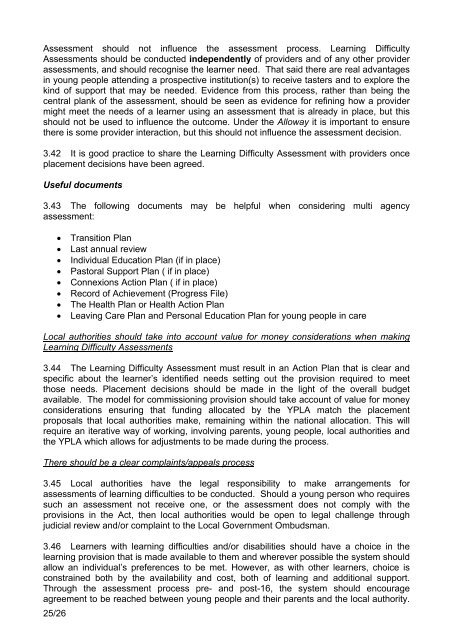Supporting young people with learning difficulties to participate and ...
Supporting young people with learning difficulties to participate and ...
Supporting young people with learning difficulties to participate and ...
You also want an ePaper? Increase the reach of your titles
YUMPU automatically turns print PDFs into web optimized ePapers that Google loves.
Assessment should not influence the assessment process. Learning Difficulty<br />
Assessments should be conducted independently of providers <strong>and</strong> of any other provider<br />
assessments, <strong>and</strong> should recognise the learner need. That said there are real advantages<br />
in <strong>young</strong> <strong>people</strong> attending a prospective institution(s) <strong>to</strong> receive tasters <strong>and</strong> <strong>to</strong> explore the<br />
kind of support that may be needed. Evidence from this process, rather than being the<br />
central plank of the assessment, should be seen as evidence for refining how a provider<br />
might meet the needs of a learner using an assessment that is already in place, but this<br />
should not be used <strong>to</strong> influence the outcome. Under the Alloway it is important <strong>to</strong> ensure<br />
there is some provider interaction, but this should not influence the assessment decision.<br />
3.42 It is good practice <strong>to</strong> share the Learning Difficulty Assessment <strong>with</strong> providers once<br />
placement decisions have been agreed.<br />
Useful documents<br />
3.43 The following documents may be helpful when considering multi agency<br />
assessment:<br />
25/26<br />
• Transition Plan<br />
• Last annual review<br />
• Individual Education Plan (if in place)<br />
• Pas<strong>to</strong>ral Support Plan ( if in place)<br />
• Connexions Action Plan ( if in place)<br />
• Record of Achievement (Progress File)<br />
• The Health Plan or Health Action Plan<br />
• Leaving Care Plan <strong>and</strong> Personal Education Plan for <strong>young</strong> <strong>people</strong> in care<br />
Local authorities should take in<strong>to</strong> account value for money considerations when making<br />
Learning Difficulty Assessments<br />
3.44 The Learning Difficulty Assessment must result in an Action Plan that is clear <strong>and</strong><br />
specific about the learner’s identified needs setting out the provision required <strong>to</strong> meet<br />
those needs. Placement decisions should be made in the light of the overall budget<br />
available. The model for commissioning provision should take account of value for money<br />
considerations ensuring that funding allocated by the YPLA match the placement<br />
proposals that local authorities make, remaining <strong>with</strong>in the national allocation. This will<br />
require an iterative way of working, involving parents, <strong>young</strong> <strong>people</strong>, local authorities <strong>and</strong><br />
the YPLA which allows for adjustments <strong>to</strong> be made during the process.<br />
There should be a clear complaints/appeals process<br />
3.45 Local authorities have the legal responsibility <strong>to</strong> make arrangements for<br />
assessments of <strong>learning</strong> <strong>difficulties</strong> <strong>to</strong> be conducted. Should a <strong>young</strong> person who requires<br />
such an assessment not receive one, or the assessment does not comply <strong>with</strong> the<br />
provisions in the Act, then local authorities would be open <strong>to</strong> legal challenge through<br />
judicial review <strong>and</strong>/or complaint <strong>to</strong> the Local Government Ombudsman.<br />
3.46 Learners <strong>with</strong> <strong>learning</strong> <strong>difficulties</strong> <strong>and</strong>/or disabilities should have a choice in the<br />
<strong>learning</strong> provision that is made available <strong>to</strong> them <strong>and</strong> wherever possible the system should<br />
allow an individual’s preferences <strong>to</strong> be met. However, as <strong>with</strong> other learners, choice is<br />
constrained both by the availability <strong>and</strong> cost, both of <strong>learning</strong> <strong>and</strong> additional support.<br />
Through the assessment process pre- <strong>and</strong> post-16, the system should encourage<br />
agreement <strong>to</strong> be reached between <strong>young</strong> <strong>people</strong> <strong>and</strong> their parents <strong>and</strong> the local authority.
















